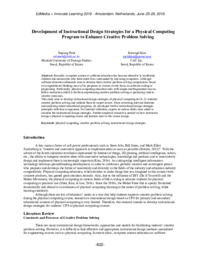Development of Instructional Design Strategies for a Physical Computing Program to Enhance Creative Problem SolvingTaejung Park, Kwangil Kim
Zu finden in: EdMedia 2018, 2018
|
 |
 Diese Seite wurde seit 6 Jahren inhaltlich nicht mehr aktualisiert.
Unter Umständen ist sie nicht mehr aktuell.
Diese Seite wurde seit 6 Jahren inhaltlich nicht mehr aktualisiert.
Unter Umständen ist sie nicht mehr aktuell.
 Zusammenfassungen
Zusammenfassungen
Recently, computer science or software education has become attractive to worldwide children and adolescents who their entire lives surrounded by and using computers. Although software education ultimately aims to develop their creative problem solving competencies based on computational thinking, most of its programs or courses overly focus on software coding or programing. Particularly, physical computing education ends with simple and fragmented easy-to-follow instruction which is far from experiencing creative problem solving or producing various creative outcomes.
This study aims to develop instructional design strategies of physical computing for K-12 students’ creative problem solving and validate them by expert review. From reviewing relevant literature and analyzing extant educational programs, we developed twelve instructional design strategies principles with four components. For internal validation, experts in various fields were asked to examine the instructional design strategies. Further empirical research is needed on how instructors design a physical computing course and learners react to the course design.
Von Taejung Park, Kwangil Kim im Konferenz-Band EdMedia 2018 (2018) im Text Development of Instructional Design Strategies for a Physical Computing Program to Enhance Creative Problem Solving This study aims to develop instructional design strategies of physical computing for K-12 students’ creative problem solving and validate them by expert review. From reviewing relevant literature and analyzing extant educational programs, we developed twelve instructional design strategies principles with four components. For internal validation, experts in various fields were asked to examine the instructional design strategies. Further empirical research is needed on how instructors design a physical computing course and learners react to the course design.
 Volltext dieses Dokuments
Volltext dieses Dokuments
 |  Development of Instructional Design Strategies for a Physical Computing Program to Enhance Creative Problem Solving: Volltext als PDF ( Development of Instructional Design Strategies for a Physical Computing Program to Enhance Creative Problem Solving: Volltext als PDF ( : :  , 258 kByte; , 258 kByte;  : :  2021-03-21) 2021-03-21) |
 Anderswo suchen
Anderswo suchen 
 Beat und dieses Konferenz-Paper
Beat und dieses Konferenz-Paper
Beat hat Dieses Konferenz-Paper während seiner Zeit am Institut für Medien und Schule (IMS) ins Biblionetz aufgenommen. Er hat Dieses Konferenz-Paper einmalig erfasst und bisher nicht mehr bearbeitet. Beat besitzt kein physisches, aber ein digitales Exemplar. Eine digitale Version ist auf dem Internet verfügbar (s.o.). Aufgrund der wenigen Einträge im Biblionetz scheint er es nicht wirklich gelesen zu haben. Es gibt bisher auch nur wenige Objekte im Biblionetz, die dieses Werk zitieren.











 Biblionetz-History
Biblionetz-History